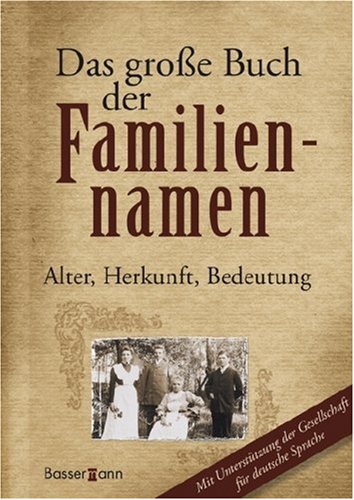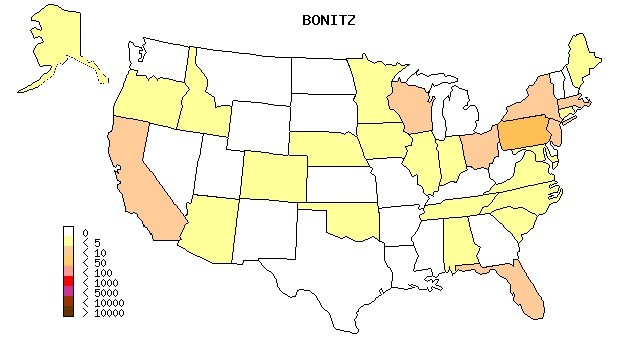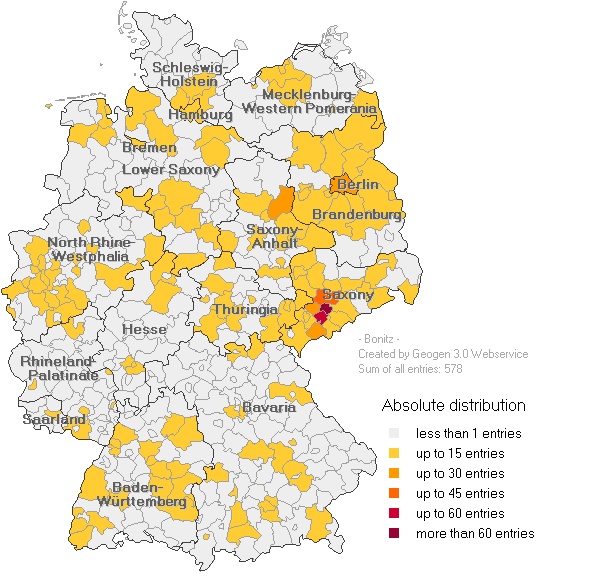Origin, meaning and distribution of the Bonitz family name
The search for the origin and meaning of the "Bonitz" surname was focused on two different approaches so far:
One idea claimed that the name had a meaning in itself and probably was derived from a word of an other language (German, Slavonic, Latin, etc.).
The other theory is based on the assumption that Bonitz is an indication of origin, and therefore looks for a location or place of origin which the name refers to.
When looking for a meaning of the name Bonitz, theories as highly imaginative as "bean farmer" or "the good one" were developed.
The old German word "bone" is interpreted as "bean, something of little value, something small, low, or inferior". The profession derived from this would mean "bean farmer".
On the other hand, the Latin word "bonus" means "kind(ly), good / well, noble". The last name Bonitz therefore would describe a person with a kind and noble character.
In both cases, the ending "itz" (also "icz") is explained by a local variation due to the Slavonic influences in the region.
However, none of these variants is proven to date, and it was not possible to identify a person whom the description was originally assigned to. As a conclusion, the assumption of a direct meaning of the surname cannot be justified to this day.
 |
The Dictionary of American Family Names, Oxford University Press, lists: " Bonitz, German, nickname of Slavic origin, from boniti 'to scare'. " This interpretation is also not confirmed so far. |
The theory of a name of origin, on the other hand, is supported by various sources.
|
The "last names encyclopedia" at www.ahnenforschung.net for example contains the listing: Bonitz => name of origin related to the place name "Ponitz". First record: de Bonizc (about 1272 A.D.) This position is also taken by Horst Naumann in his book about last names ("Das große Buch der Familiennamen"): "de Bonizc in 1272". H. Grünert also indicates in his book "Family names in the Altenburg region" that the Bonitz family name is first mentioned in 1272 as "de Bonizc". |

|
The first record of the place "Ponicz" is found in a document of 1254.
Regarding the meaning of the village's name, there are again two suppositions: It is a common position that the name is derived from the Slavonic word "poniz" (= to sink, to deepen, degrades, deepens) which refers to the settlement's situation in a dale. Therefore, the name Ponitz is characterized as a landscape name.
Another variant goes back to the Slavonic term for "cultivation" and tries to link the place name to the widespread method of burning down primeval forest in order to convert it to farmland.
All early records mentioning the settlement Ponitz were always associated with the castle of Ponitz. Due to its size, the castle and the accompanying assets were one of the most important castles in the duchy of Saxonia-Altenburg. The castle claimed responsibility for all rulings of the local hereditary and high courts for the parishes of Ponitz, Schönhain, Guteborn, Gosel, Zschöpel, and Dreussen.
The oldest records of Ponitz castle date back to the year 1254. The owners at that time were the masters "of Ponicz". Fridericus de Ponicz is mentioned as a witness to negotiations, concerning the Remse monastery.
1271 A.D. Walther de Ponitz is mentioned.
In 1274 Friedrich of Bonitz donates a mill to the monastery of Crimmitschau.
In 1303 Walther of Ponitz is listed as a member of the Altenburg town council.
1329 A.D. Heinrich of Ponitz and Friedrich Hermann of Ponitz are mentioned.
In 1349 knight Friedrich of Ponitz is described as "proprietor of Ponitz".
About 1365, the family line "of Ponitz" seems to have left the place. The castle was transferred to the Weißenbach ("Wissinbach") family, followed by a family called "Ende". In 1568 the castle was sold to Abraham of Thumbshyrn.
Ever since, the Ponitz (or Bonitz) family name was never again recorded in Ponitz.
Unfortunately, there are very few sources available to prove any occurrence of the Bonitz family name during the 14th and 15th century.
In 1497, Jorg Bonitz is mentioned as owner of the largest property in Kühnhaide. Kühnhaide is located in Saxony at the edge of the ore mountains. Today, Kühnhaide belongs to the city of Zwönitz. It is located about 30 miles south-east of Ponitz.
Starting about 1500 A.D., there are many Bonitz families recorded in Zwönitz, who, in old registers, are often written as Bonitz, Ponitz or Poniz. Later on, the "Bonitz" spelling prevailed.
Since that time, Zwönitz is the place of origin to which almost all modern Bonitz families can be linked.
Today's distribution of Bonitz families in the USA
The surname Bonitz was introduced into the USA by immigration. As a result, there is no clear defined center or place of origin within the U.S. However, it can be noticed that the name is most seen in Pennsylvania. Other occurrences are in Ohio, New York, Wisconsin, California and Florida.
The north-eastern states were originally preferred due to their good farming conditions. More recently, also more sunny locations like Florida or California were added.

Today's distribution of the family name Bonitz in Germany
The family name Bonitz is currently present in various regions of Germany, but there is a clear concentration in Saxony. The city of Chemnitz as well as the surrounding Stollberg county show the most entries.
This map displays the occurrences of Bonitz in Germany, based on public white pages listings of 2002.

Graphic created by Geogen.
Last update of this page: August 01, 2007
© 2000-2024 by Jochen Bonitz